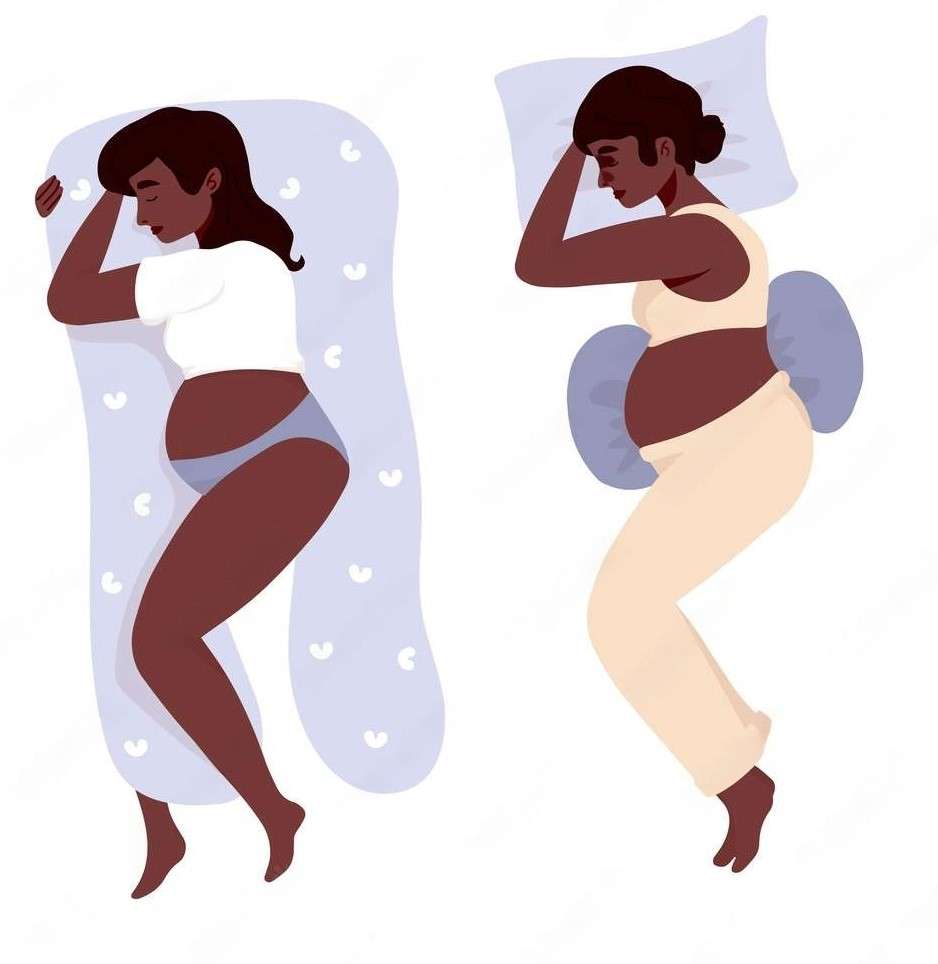During your third trimester, you might feel that your bed has shrunk. Your common sleep stealers are no longer your binging web series or movie marathons but instead are the aches, pains, insomnia and nightmares which are common in the last months of pregnancy.
A few simple tricks can combat these culprits and turn your bed back into a welcoming place.

1. Change Positions

Your doctor has likely recommended that you sleep on your left side now. Research says that this position provides optimal blood flow to your baby, uterus and kidneys. But if you’re used to sleeping in a different position, or if your belly just makes it hard to get comfortable, some strategically-placed pillows like wedges or semi circle ones can help. Try placing a wedge-shaped pillow under your belly to support it. Tucking a pillow between your legs, supporting your back with several firm pillows or curling around a body pillow can also help you feel cocooned rather than restless.
● While changing sides sit up and turn around – There are known instances where the umbilical cord wraps around the baby while the mom tosses and turns around. So sitting up before turning around will ensure that the chord doesn’t knot around the baby causing him/her discomfort.
2. Drink up!

Drink plenty of fluids during the day, but try to cut down before bedtime to minimize frequent nighttime urination.
● Drink a glass of warm milk with turmeric before bed – Drinking milk before bed helps you to fall asleep faster. But adding the turmeric is to give an additional anti-bacterial protection while controlling your blood sugar and helping with any inflammations and joint pains.
● Have a bottle of water near while sleeping and drink it after peeing each time – If the water is not available near you, sometimes you may forget to drink it and end up dehydrated. This can be avoided by having a bottle of water near you.
3. Save Sleep for Night

Hard as it may be to keep your eyes open at dinner, cutting down on naps may improve your nighttime sleep. Writing for “Reader’s Digest,” University of Pennsylvania sleep researcher Grace Pien, M.D. compares napping to snacking before a meal. Even a small snack will diminish your appetite, just as a nap will diminish your need for sleep. If you wake up feeling exhausted, try taking a short nap mid-day, then take walks to keep yourself feeling alert until bedtime. Taking a warm bath or listening to soothing music might help you feel drowsy before crawling into bed.
● Avoid exercising a few hours before bed – Since exercising increases blood flow, the heart rate will be higher which will keep you awake longer than necessary.
● Avoid unwanted advice- Practice unhearing every bit of random advice that comes your way.
● Gadget use Timed- Schedule a 30 min slot to check your updates on phone and surely no using phone after dinner
4. Chill out. Literally.
Your body temperature is higher now that you’re pregnant, so it may help you sleep better if you lower the thermostat in the bedroom. (Yes, even if it’s winter — you’re never going to rest well if you’re boiling!)
Tend to go hot-and-cold? Tuck an extra quilt at the foot of the bed to pull up if you start to feel chilly. Your partner nearby is another effective thermostat!
5. Get into a new bedtime routine.
Do get stressed. Avoid topics that you know will lead to misunderstandings or arguments. If you establish a consistent, soothing, and comforting evening routine, you’ll be able to relax and drift off to sleep with more ease.
As bedtime approaches, try a few of these soothing rituals to see if one sticks:
● Drink a cup of caffeine-free tea or a warm cup of milk with honey
● Have a small snack. Try a handful of peanuts and a few crackers or whole-grain cereal with skim milk. These combos of carbs and tryptophan are known sleep-promoters.
● Read a chapter of a pleasant book or listen to podcasts which is not about pregnancy.
● Get a shoulder massage or having your hair gently brushed to relax your muscles and hair follicles will work wonders.

